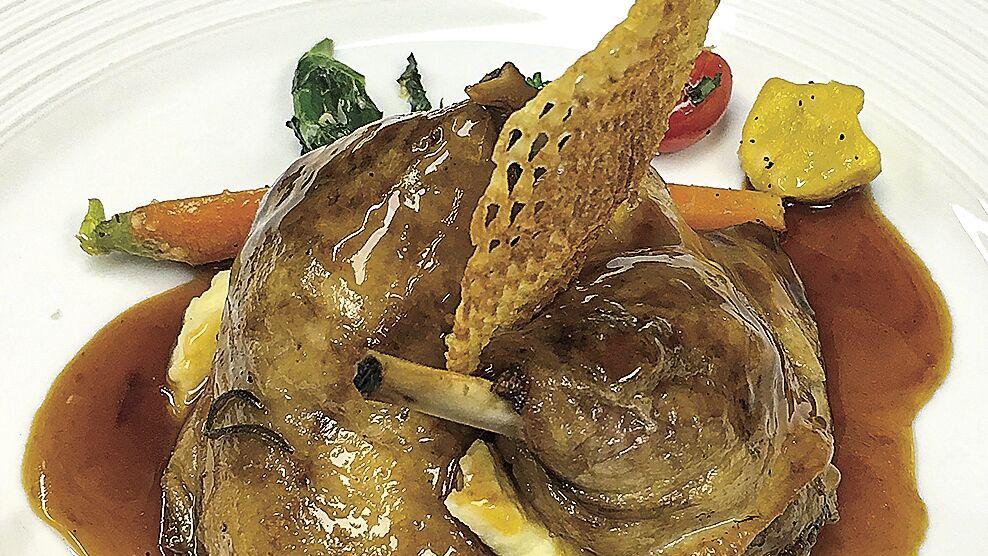
No, I’m not talking about the classic turkey. I’m talking about the abundance of other wild birds around here this time of year, like teal and wood ducks, or the Canada geese that live in Florida all year long and basically have given up on migration because there is a year-round food source here. All the more reason for the chef in me to think we should eat more of them.
Waterfowl season in Florida is open right now and runs until the last day of January. For information on bag and possession limits, which vary by species, go to http://bit.ly/2WBYqVe.
I personally don’t target diving ducks because I don’t think they’re the best of our table ducks. I think the best duck to eat around here is the muscovy, which is open all year since it’s considered an invasive species here. It’s said that some migrated to the southern U.S., while others were introduced to Florida by private landowners as ornamental pets. They’re pretty common around Southwest Florida; just go drive by any golf course and you might see a few of them waddling around and making a lot of noise.
Geese are traditional holiday birds in most of Europe, and if you want to go with that option you can do it in Florida. We have Canada geese, which are considered native birds and have a season. Then there are Egyptian geese, which like muscovies are well-established exotics with no closed season or bag limits.
Now you should have some idea of what kind of waterfowl you can hunt right now in our area. Just always refer to the FWC hunting rules and regulations regarding where, when and how many birds you can harvest — and be sure before you pull the trigger that you know exactly what species of bird is in your sights.
I always do what everyone else does on Thanksgiving and cook a turkey. But on Christmas, I usually serve duck. While I like to prepare duck several ways, one of my favorite ways is to confit (it’s French, so say “con-FEE”) the whole bird.
This is a very old method of cooking and storing foods after they have been cooked, developed way before the advent of a fridge. The idea is to cook the bird in its own fat. Yes, fat. Hey, it’s the holidays — indulge yourself with foods you don’t normally eat, like a duck cooked in its own fat. Just ask most any chef and they will tell you that fat equals flavor.
Storing your duck confit is easy. It will keep for several months if it is stored in its own fat and the temperature stays below 72 degrees. The entire bird must be submerged into the fat, leaving nothing exposed to air. Any meat the air touches will sour and become unfit to eat. Since we’re not living in the Middle Ages, I suggest you place it in your fridge at an even lower temperature to help avoid the chance of foodborne illness.
Traditionally, each part of the duck confit is used for a specific purpose. For example, the neck bones and meat are used to make a wonderful sauce or sometimes it’s turned into a thick and hearty stew called garbure, which is savory and so dense it’s usually eaten with a fork.
I like to eat the thighs and drumsticks of duck confit with a savory sauce, then pull the rest of the meat from the bone and use it to make other dishes. Duck quesadillas are good, or maybe a salad with duck, nuts and berries over greens and topped with a light dressing. The possibilities go on and on as to what you can do with the pulled meat.
I suggest you confit the whole bird, then break it down and then decide what you want to do with it. There’s no need to be in a hurry to come up with a plan for the meat. Remember, it keeps for a long time in the fridge while stored in its own fat.
Chef Tim Spain is a Florida native and has years of experience cooking professionally, both in restaurants and in private settings. He offers private catering and personal culinary classes. For more info, visit ChefTimSpain.com or call 406-580-1994.
"bird" - Google News
December 24, 2020 at 06:00AM
https://ift.tt/34I56ZQ
A special bird for Christmas | Waterline - yoursun.com
"bird" - Google News
https://ift.tt/2s1zYEq
https://ift.tt/3dbExxU
Bagikan Berita Ini














0 Response to "A special bird for Christmas | Waterline - yoursun.com"
Post a Comment